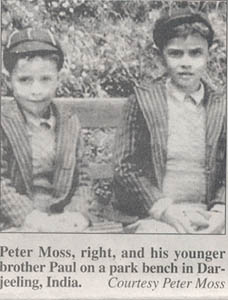

|
Not long ago, on a trip to India, I strayed from the tourist path and ended up in the railway town of Kharagpur some seventy miles west of Calcutta. What I discovered was a small but thriving Anglo-Indian community, a legacy of the intermarriage between colonial 'whites' and their darker-skinned spouses from the great subcontinent, during British rule. There's a story here, I thought, for though there seems to be no shortage of books about the days of the Raj and India's independence and modern novels from the likes of Vikram Seth, Rohinton Mistry and Manil Suni, little or nothing has been written about the in-between world of the Anglo-Indians. Largely invisible, shunned by the British and beyond the pale of an acceptable Indian caste system, they were called "eight-annas" (sixteen annas to the rupee in my day), "chee-chees", "Eurasians" and "blacky-whites". In a recent interview for a Cambridge University magazine, veteran journalist Mark Tully (Trinity Hall 1956) commented that being born and raised in India his nanny was English ("to make sure we didn't pick up a chee-chee accent") his friends only British and "we never mixed with Anglo-Indian children". Well, it appears the story has now been written with Peter Moss' recently published Bye Bye Blackbird - An Anglo-Indian Memoir. "Why had we," he asks "who were once so many, who had formed the cartilage in the anatomy of India…been so poorly chronicled? Why was it so hard to trace our descent or track down our history? Why was so much of who we were, what we had done, vanished beyond recall? Because we had been taught to live with shame. Because to admit that we were who we were was to accept that disparagement, perhaps even the scorn, of those we desperately strove to emulate; those who would see us as 'touched by the tar brush'." Moss proceeds to sketch, with a deft hand, his early childhood in India and the Anglo-Indian community which worked and lived largely in the railway 'colonies' represented by places like Kanchrapara and Alighar, Jamalpur and Tatanagar.
When a sort of diaspora takes place in 1946, just before Partition, many Anglo-Indians rush to England fearing perhaps that the legitimacy of their British citizenship might be questioned. For some, the "land of their fathers" falls short of their expectations. "The smallness, the narrowness, the Lilliputian scale of everything"
is what depressed eleven-year-old Moss. His father, William Moss, though
a Cockney "born within the sound of London's Bow Bells" suffers
a nervous breakdown. Driven by a crazy Irishman, Paddy Garrow-Fisher, the journey is scheduled to take six weeks from London to Bombay subject of course to Acts of God, political upheaval and impassable roads. Moss' retelling of this trip alone is worth the price of admission, as is his return in 1978 to the railway institute in Kanchrapara where, at first, he is prevented from entering by a trio of lathi-brandishing oafs and, later in the day, invited to make a speech as a visiting V.I.P. As a former newspaper reporter and now head of publicity for the Hong Kong Government, Moss has a professional's eye for detail and a gift for an apt turn of phrase. The result is that "Bye Bye Blackbird" joins a very circumscribed selection of books dealing with the perspective of the Anglo-Indian Community which, recently, has been given a boost by William Dalrymple's White Mughals and predated by Jamila Vavin's Out of India - An Anglo-Indian Childhood and Carl Muller's quasi-fictional memoirs of Eurasian railway families. Now, we have "disappeared like the lost tribes of Egypt" writes Moss, "Like so many other civilizations that have left behind their tantalizing traces in fallen monoliths and jungle ruins. We Anglo-Indians have become an endangered species, our heritage steadily eroded until it must inevitable disappear into oblivion." (Martyn J. Clark is a Victoria writer who spent the first thirteen years of his life in India.) |